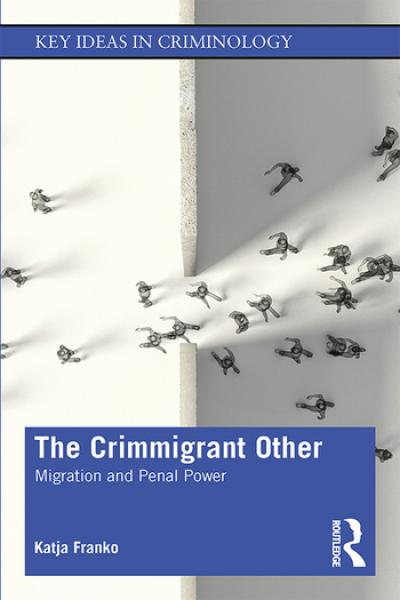Post by Ana Aliverti. Ana is a Reader in Law at the School of Law, University of Warwick. Her research explores questions of national identity and belonging in criminal justice, and of law, sovereignty and globalization. She is currently writing a monograph on migration policing in the UK based on a research project exploring police and immigration collaboration in everyday policing funded by the Leverhulme Trust, the Economic and Social Research Council and the University of Warwick. This is the first post of Border Criminologies Book Discussion Week The Crimmigrant Other: Migration and Penal Power.
Review of ‘The Crimmigrant Other: Migration and Penal Power’ by Katja Franko (Routledge, 2019)

Such a key figure, Franko observes, has propelled a reconfiguration of state penality giving rise to what she terms ‘bordered penality’. This retooling of penal power to expel unwanted foreigners has altered ‘normal’ penality in its qualitative and quantitative dimensions. As her work shows, the emergence of this new form of ‘bordered penality’ has uncovered blind spots in the traditional criminological focus of the prison as index of punitiveness and has unsettled assumptions on the leniency of Scandinavian penal systems (see also Barker 2018). Against its reputation as a ‘humanitarian superpower’, Norway –where her analysis is focused on- has been developing an impressive deportation machine annexed to its criminal justice system geared to arrest and send out some foreigners in lieu of or in addition to criminal prosecution and conviction. Its punitive nature is however subtle, since as she argues ‘deportation represents an invisible punishment’, not only because it is not conceptually recognized and measured as such, but more importantly because it operates to invisibilise those subject to it -by sucking people in and throwing them out. And yet, its painful impact and global ramifications are felt by deportees, their families and the wider community. Franko’s analysis makes apparent the inadequacy of theoretical and philosophical conceptualizations of punishment that are oblivious to its empirical articulations. The what, the why and the who of punishment, she reminds us, remain critical for understanding its contemporary contours and for doing normative work (see also Fassin 2018).
The book places these developments within a global complex of unequal geopolitical relations. State penality has always been entangled with and part of imperial experiments, with Northern states historically wielding their power extraterritorially and exporting their penal models further south. The prominence of the crimmigrant other in the criminal justice policies of Northern states, Franko argues, has brought to the fore such geopolitical dimensions of state penal power. She explores such (neo) colonial dynamics at the European level. Under the auspices of the European Union, the work of Frontex -Europe’s border force- has gained an unprecedented level of support and has fostered a new form of European solidarity around border controls. The north-south trajectory of its operations, in the form of the patrol of Europe’s external borders and the coordination of deportation flights, demonstrates the relevance of geopolitics for understanding state power. The currency of border controls as a crime control strategy has also exposed power imbalances and inequalities at the heart of Europe, as the new impetus to punish and expel in western European countries are increasingly oriented towards (and its consequences borne by) their eastern neighbors.
The intricate and complex interactions of crime and immigration controls in contemporary penality to protect north-western privilege has also given rise to a new moral economy of state penal power which thrives and is legitimized by the twin purposes of protection and repression. Although a longstanding feature of state penality, the operation of ‘bordered penality’ takes this duality to a new level of sophistication, most evident in the treatment of children and families, and the policies around human smuggling and trafficking. Yet, in turning ‘accidents of birth’ and privilege into matters of morality, Franko demonstrates, the exercise of penal power finds its own limits. In this part of the book (chapter 4 on Policing Europe’s humanitarian borderlands) the empirical material provides its richest, more illuminating insights on the human costs and pain of border controls not only for the people subject to coercion but for those tasked with inflicting them. It recounts moments of doubt by officers working within Frontex about the ethics of their mission. Such moments of moral reckoning and discomfort -which I have also found in my work with British immigration officers (Aliverti 2020)- are powerful and central for critique.
Franko’s book invites us to rethink key notions in criminology and sociology of punishment regarding the relationship between citizenship, law, justice and punishment from a European perspective. The emergence of a parallel system of ‘abnormal justice’ and ‘bordered penality’ reserved for unwanted foreigners -or crimmigrant others- in contemporary Europe attests to another face of the continent, traditionally depicted as sequestered from Anglo-American punitivism and penal excesses. The consensus within Europe to border its shores and expel unwanted migrants, she argues, marks a reversal from ‘Europe’s tradition of strong commitment to human rights and humanitarian principles’ (p.4). While the contrast drawn between ‘normal’ and ‘abnormal’ systems of justice and between a progressive European past and a punitive present might be overstated, the book offers important conceptual and empirical tools to refocus contemporary debates on criminal justice and punishment in Europe and further afield. It will appeal to researchers and students interested in criminal justice, border controls, human rights and migration within law, sociology, anthropology, criminology, geography and politics.
Any comments about this post? Get in touch with us! Send us an email, or post a comment here or on Facebook. You can also tweet us.
__________
How to cite this blog post (Harvard style)
Aliverti, A. (2020). Book Review: The Crimmigrant Other: Migration and Penal Power
Share:








